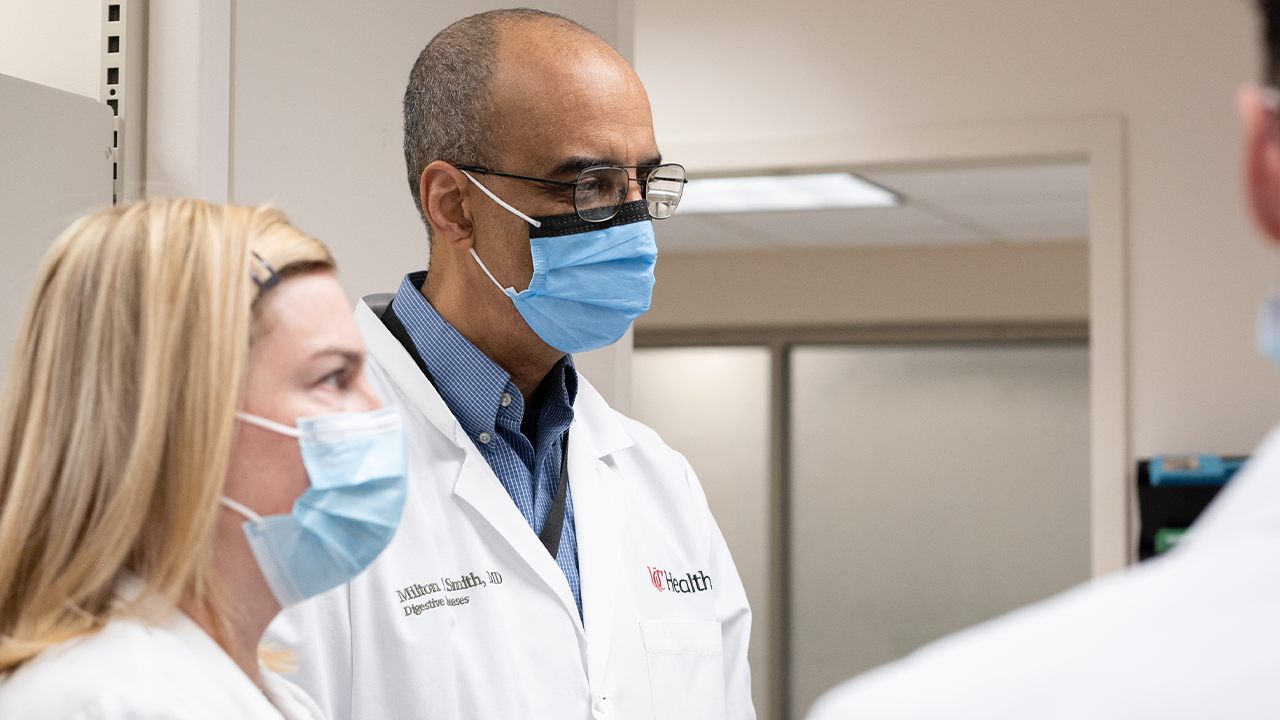Mesothelioma, an aggressive cancer that develops in the mesothelium, is caused by asbestos — a mineral comprised of needle-like fibers. When inhaled into the lungs, asbestos lodges itself and migrates into the pleural lining. Eventually, those fibers wreak havoc, causing inflammation and damaging cells until they turn cancerous.
There are four categories of malignant mesothelioma, depending on where the cancer is located in the body. Of the four types, 75% of diagnosed cases are malignant pleural mesothelioma (MPM), with cancer growth being localized in the thoracic cavity and encasing the lungs. This cancer grows rapidly and spreads to surrounding organs.
“Fortunately, malignant pleural mesothelioma (MPM) is extremely rare — there are about 1,500 new cases each year in the U.S. Interestingly, a large amount of those cases are here in Ohio,” says Robert M. Van Haren, MD, assistant professor in the Department of Surgery at the University of Cincinnati College of Medicine and a UC Health thoracic surgeon.
Dr. Van Haren continues, “It is difficult to diagnose it because patients’ symptoms are often common across many disorders including shortness of breath and chest pain. Additionally, MPM has a long latency period (the time between asbestos exposure and the start of symptoms) before diagnosis.”
The average mesothelioma latency period is 40 years, but the cancer can show as early as 10 to 15 years after heavier asbestos exposures. With no approved screening for mesothelioma in existence, detecting the disease requires symptoms, risk factors and patient history. If you’ve had exposure to asbestos, it’s worth discussing with your healthcare provider.
UC Cancer Center’s Lung Cancer Center is the only one in the Greater Cincinnati region that offers comprehensive care for mesothelioma, including systemic therapy, radiation and surgery. Our experts continually search for new treatments to improve outcomes for those who have mesothelioma.
“Regular biopsies that look at pleural fluid form thoracentesis often don’t detect MPM, so we perform what’s called a pleural biopsy in the operating room. It’s a delicate procedure that removes a small piece of the pleura,” Dr. Van Haren explains. “Our biological pathologists look at the biopsied tissue under a microscope and identify MPM based on the specific pleuritic strains that are present.”
Treatment options for mesothelioma are determined by:
- The level or stage of cancer.
- Whether the cancer is localized or metastatic (spread to other areas of the body).
- A patient’s medical comorbidities and what they can tolerate in terms of therapy/procedures.
Patients with localized disease who are considered otherwise healthy are good surgical candidates. Their treatment involves a combination of surgery, chemotherapy and radiation therapy.
Life expectancy for patients with MPM is approximately 18 months, with 55% living longer than six months, roughly 35% living longer than one year and on average, 9% survive five years or more, according to the Mesothelioma Center.
Although there is no cure for MPM, new advancements in treatment are giving hope to patients and enabling increased awareness of the deadly disease.
“At UC Health, we are always searching for even better options to treat patients with this complex disease.” says Dr. Van Haren. “Two new medications were FDA-approved for treatment of malignant pleural mesothelioma in October 2020, marking the first advancement for MPM in the last 16 years — it’s very exciting.”
The new medications (OPDIVO® and YERVOY®) are newly considered as the first-line treatment for “unresectable” malignant pleural mesothelioma — meaning it cannot be removed surgically. This treatment process, called immunotherapy, is offered at West Chester Hospital.
Immunotherapy – Why It Works for Mesothelioma and Other Cancers
Immunotherapy uses medication to increase the body’s own immune system, helping it attack and kill cancer cells. The medications are a type of monoclonal antibody — called immune checkpoint inhibitors — which “highlight” cancer cells so the immune system is able to recognize them and attack.
Specializing in thoracic surgery, with focused expertise using minimally invasive techniques such as robotic surgery and comprehensive multidisciplinary care for aggressive cancers, Dr. Van Haren works alongside a team of surgeons and oncologists, offering highly specialized care for mesothelioma — and other lung cancers as well. Dr. Van Haren is actively involved in research, searching for ways to improve patient outcomes after surgery and to reduce disparities in care for minority groups diagnosed with mesothelioma cancers.
“Treatment of MPM can potentially have many complications, so it is important that patients are seen by professionals who have as much experience as possible,” Dr. Van Haren says. “At UC Health, we are able to confidently provide our patients with their best outcomes.”
